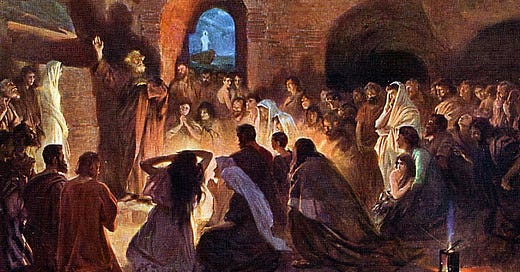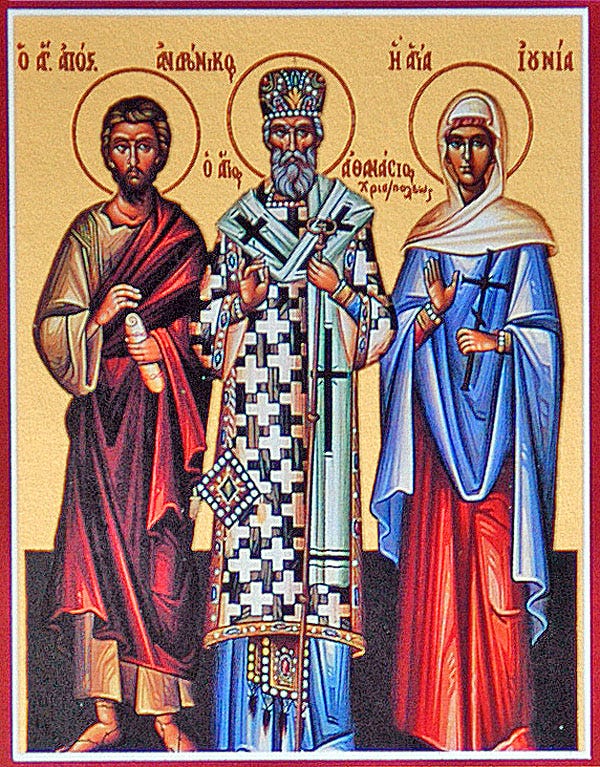"Repentance is not when you cry, but when you change!"
+ Spiritual Counsels
Acts 12:1-11 (Epistle)
1 Now about that time Herod the king stretched out his hand to harass some from the church.
2 Then he killed James the brother of John with the sword.
3 And because he saw that it pleased the Jews, he proceeded further to seize Peter also. Now it was during the Days of Unleavened Bread.
4 So when he had arrested him, he put him in prison, and delivered him to four squads of soldiers to keep him, intending to bring him before the people after Passover.
5 Peter was therefore kept in prison, but constant prayer was offered to God for him by the church.
6 And when Herod was about to bring him out, that night Peter was sleeping, bound with two chains between two soldiers; and the guards before the door were keeping the prison.
7 Now behold, an angel of the Lord stood by him, and a light shone in the prison; and he struck Peter on the side and raised him up, saying, “Arise quickly!” And his chains fell off his hands.
8 Then the angel said to him, “Gird yourself and tie on your sandals”; and so he did. And he said to him, “Put on your garment and follow me.”
9 So he went out and followed him, and did not know that what was done by the angel was real, but thought he was seeing a vision.
10 When they were past the first and the second guard posts, they came to the iron gate that leads to the city, which opened to them of its own accord; and they went out and went down one street, and immediately the angel departed from him.
11 And when Peter had come to himself, he said, “Now I know for certain that the Lord has sent His angel, and has delivered me from the hand of Herod and from all the expectation of the Jewish people.”
John 8:31-42 (Gospel)
31 Then Jesus said to those Jews who believed Him, “If you abide in My word, you are My disciples indeed.
32 And you shall know the truth, and the truth shall make you free.”
33 They answered Him, “We are Abraham’s descendants, and have never been in bondage to anyone. How can You say, ‘You will be made free’?”
34 Jesus answered them, “Most assuredly, I say to you, whoever commits sin is a slave of sin.
35 And a slave does not abide in the house forever, but a son abides forever.
36 Therefore if the Son makes you free, you shall be free indeed.
37 I know that you are Abraham’s descendants, but you seek to kill Me, because My word has no place in you.
38 I speak what I have seen with My Father, and you do what you have seen with your father.”
39 They answered and said to Him, “Abraham is our father.” Jesus said to them, “If you were Abraham’s children, you would do the works of Abraham.
40 But now you seek to kill Me, a Man who has told you the truth which I heard from God. Abraham did not do this.
41 You do the deeds of your father.” Then they said to Him, “We were not born of fornication; we have one Father – God.”
42 Jesus said to them, “If God were your Father, you would love Me, for I proceeded forth and came from God; nor have I come of Myself, but He sent Me.
Apostle Andronicus of the Seventy and his fellow-laborer, Junia (1st c.)
Saint Andronicus Apostle of the Seventy and Saint Junia were relatives of the holy Apostle Paul. They labored much, preaching the Gospel to pagans. Saint Paul mentions them in his Epistle to the Romans: “Salute Andronicus and Junia, my kinsmen and fellow prisoners, who are of note among the Apostles, who also were in Christ, before me” (Romans 16:7).
Saint Andronicus was made Bishop of Pannonia, but his preaching also took him and Saint Junia to other lands, far from the boundaries of his diocese. Through the efforts of Saints Andronicus and Junia the Church of Christ was strengthened, pagans were converted to the knowledge of God, many pagan temples closed, and in their place Christian churches were built. The service in honor of these saints states that they suffered martyrdom for Christ.
In the fifth century, during the reign of the emperors Arcadius and Honorius, their holy relics were uncovered on the outskirts of Constantinople together with the relics of other martyrs at the gate of Eugenius (February 22).
It was revealed to the pious cleric Nicholas Kalligraphos that among the relics of these seventeen martyrs were the relics of the holy Apostle Andronicus. Afterwards, a magnificent church was built on this spot.
The Acts of the Apostles and Evangelism
by Fr. Ted Bobosh
The Gospel lessons for the Post-Paschal Sundays are wonderfully rich and deep and give us a treasury of inspired ideas to contemplate. The “other” readings we do each Sunday, called the Apostolos or reading from the Apostles (which we frequently refer to as the Epistle reading) is also Scripture, the Word of God and so essential to our understanding God’s own revelation. We might get the idea that since the Gospel lessons give name to each of the Post-Paschal Sundays (for example, the 5th Sunday of Pascha is called The Sunday of the Samaritan Woman), that the reading from the Acts of the Apostles is somehow of secondary importance, but not so! “All scripture is inspired by God and profitable for teaching, for reproof, for correction, and for training in righteousness, that the man of God may be complete, equipped for every good work” (2 Timothy 3:16).
Acts 11:19-30 begins by noting that the first Christians concentrated their evangelistic efforts exclusively on their fellow Jews even after Stephen’s death at the hands of the Jews. Being persecuted by their fellow Jews did not detour them from trying to convince the Jews that Jesus is Lord, God and Messiah. However, some of these early Christians, fleeing the persecution that began in earnest after the martyrdom of Stephen, went to the city of Antioch starting a successful mission to the Gentiles. It is in Antioch that the name “Christian” is bestowed on those who believe Jesus is Messiah. The Antiochian Christians are direct descendants of this original mission work of the early Church. The Antiochian mission is the oldest of the Christian missionary endeavors.
Note that in Acts 11, it is nameless Christians who are doing the evangelism not the apostles!
Now those who were scattered because of the persecution that arose over Stephen traveled as far as Phoenicia and Cyprus and Antioch, speaking the word to none except Jews. But there were some of them, men of Cyprus and Cyrene, who on coming to Antioch spoke to the Greeks also, preaching the Lord Jesus. And the hand of the Lord was with them, and a great number that believed turned to the Lord.
The text only identifies these evangelists only as “some of them” but they are not the Apostles. This evangelism is not intentional church planting but rather the result of the Christians being persecuted and scattered through the countryside. Fleeing persecution, they go into the city of Antioch and find people receptive to their message. They are being persecuted and fleeing and yet they are proclaiming Good News! What seemed so good to them that despite being persecuted, running for their lives and becoming homeless refugees, that they still believed they had a message from God to offer to others? Today prosperity Gospel people try to sell others on the notion that “faith” will lead to prosperity and good times. But the early Christians had to acknowledge the truth that belief will lead to persecution – as Jesus had warned – and despite this others still join them. The Kingdom of Heaven was desirable even though one had to suffer for it. We should be so faithful! We are not to be fair weather Christians – claiming to be Christians because it brings us prosperity, because times are good. We need to be Christians even if we are living in poverty or in persecution. That is true faith.
Note also, the faith is spreading ahead of or beyond any organized missionary outreach of the apostles.
And the hand of the Lord was with them, and a great number that believed turned to the Lord. News of this came to the ears of the church in Jerusalem, and they sent Barnabas to Antioch.
The Apostles aren’t doing the evangelism, they hear that the faith is spreading and have to catch up with what the Holy Spirit is doing! The Apostles are themselves learning what the Holy Spirit is doing throughout the world. Rather than being led by the Spirit, the Apostles are following what the Spirit is doing elsewhere in the world. Despite the fact that the Holy Spirit is leading evangelism far beyond the reach and knowledge of the Apoostles, the efforts of evangelism had to be approved of and endorsed by the apostles – already there is church structure and hierarchy, a recognized leadership – the apostles don’t accept that everyone can do and teach what they know to be the truth. The Apostles insist on correct doctrine and church unity. The apostles have the power to recognize which Christian communities are legitimate and they insure that correct doctrine is being taught. They are determining who is in communion with them. On the other hand, the believers don’t wait for the apostles to tell them what to do, they are not looking to Jerusalem or Constantinople to tell them when and where to start new missions. All the believers are both living the faith and sharing it with others. The Apostles however maintain the right to determine who is teaching the true faith. The Apostles do send their representatives out to ensure there is correct doctrine and also that the new Christian respect apostolic authority.
Barnabus, the Apostle’s appointed delegate, looking at the new missionary effort and Christian community, “saw the grace of God” – grace can be seen, it is visible. He was able to see with his own eyes what the Holy Spirit was accomplishing. The work of the Holy Spirit in our own lives should be so visible to us, to the saints and to non-believers.
When he came and saw the grace of God, he was glad; and he exhorted them all to remain faithful to the Lord with steadfast purpose; for he was a good man, full of the Holy Spirit and of faith. And a large company was added to the Lord.
Barnabus’ response to this new unplanned mission is joy and gladness. He offers encouragement to these new believers. He doesn’t feel threatened by or worried about the fact that new people are embracing Christianity even though the disciples themselves are not responsible for this church growth. He exhorts these new disciples to continue with the Lord, to remain loyal, for discipleship is a continuous process of devotion. Being a Christian is not a one time conversion but is a lifetime process of living the Gospel.
Note also when the Christians in Antioch learn of the impending famine threatening their fellow Christians, they don’t wait for fund raising letters from the Jerusalem or the Apostles, they take action themselves – they know what their response should be as Christians. They understand their role in the church is to practice love.
Now in these days prophets came down from Jerusalem to Antioch. And one of them named Agabus stood up and foretold by the Spirit that there would be a great famine over all the world; and this took place in the days of Claudius. And the disciples determined, every one according to his ability, to send relief to the brethren who lived in Judea; and they did so, sending it to the elders by the hand of Barnabas and Saul.
May we too be inspired to live the Gospel, to do what we know we should be doing as God’s people in terms of evangelism and charity. Bringing both the Good News of eternal life to all as well as the love of God in the form of charity.
This brings us to the Gospel of the Samaritan Woman (John 4:5-42). First though I remind you of the words of our Lord Jesus:
You did not choose me, but I chose you and appointed you that you should go and bear fruit and that your fruit should abide; so that whatever you ask the Father in my name, he may give it to you. This I command you, to love one another. (John 15:16-17)
Jesus goes into the land of the Samaritans – into a foreign land which belongs to those who consider the Jews their enemies. Christ is showing us we are to have a relationship with the world – with those who don’t know the Gospel, who don’t understand God as, with those whom we may be suspicious about or consider them to be dubious people. What should our relationship be with old friends and family who aren’t Orthodox? The Samaritan woman shows us the way – she goes to them and talks to them about her encounter with Jesus. She doesn’t tell these others how wrong they are in beliefs and practices, rather she extols Christ.
For His part, Jesus doesn’t judge the Samaritan woman for her life/lifestyle – she has been in multiple relationships with men, serial monogamy some would say. He is irenic toward her, and calmly, wisely and gently leads her way from a worldly perspective to the truth. But note first he asks her for help – give me a drink. He helps bring her to the faith by first showing his own vulnerability, his own dependency, and that He needs the Samaritan woman to help Him. That even becomes the basis of their conversation, for the woman quite rightfully can see the obvious – you can’t even get yourself a drink of water, how are you going to give me “living water“? Jesus uses his obvious weakness and need to lead her into a conversation about the Kingdom. He does not rebuke her sinfulness, but leads her to the kingdom. Jesus fulfills what He has taught:
I am the good shepherd; I know my own and my own know me, as the Father knows me and I know the Father; and I lay down my life for the sheep. And I have other sheep, that are not of this fold; I must bring them also, and they will heed my voice. So there shall be one flock, one shepherd. (John 10:14-16)
The Scriptures today show us two ways that we Christians might respond to strangers, to non-believers, to those we don’t like, and even to our enemies. 1) We might find that others reject our message and lifestyle, that others not only reject us but want to persecute us to change our minds or to drive us out of their towns. We might have to find a new place to live and new people with whom we can share the Gospel. Or, 2) We can show our humility by asking others for their help, showing our own vulnerability and humanness, recognizing that we are in need of and share their resources. Only then, when we have established a human relationship do we share with others the Good News of salvation as Jesus did with the Samaritan woman. Instead of doing imperialistic evangelism (where we wrongly show our superiority and proclaim our triumphalism), we are to establish relationships with others first by showing we need them to be our neighbors. [By the way, the Samaritan Woman is not anonymous, for in tradition we know her name as Photini.]
Whether we encounter people who are non-believers or are hostile to us, we are to respond as Christ did and as His disciples. As St John Chrysostom once said, “Our warfare is to make the dead to live, not to make the living dead.”
This week’s calendar reminders:
Monday 5/12: Matins 8:30 a.m.; Stewards’ Meeting 6:30 p.m.
Tuesday 5/13: no services or events
Wednesday 5/14: no services or events
Thursday 5/15: Matins 8:30 a.m.
Friday 5/16: Matins 8:30 a.m.
Saturday 5/17: Catechumen Class 4:30 p.m.; Great Vespers 6 p.m.
Sunday 5/18: Divine Liturgy 9:15 a.m.
CLICK BELOW to donate online:
Christ the Savior Orthodox Church is located in Southbury, Connecticut, and is part of the New England Diocese of the Orthodox Church of America.
Mailing address: Christ the Savior Church, 1070 Roxbury Road, Southbury, CT 06488
PLEASE DONATE to help our parish do the work of the Lord, thrive and grow, and extend the Kingdom of God. May the Lord bless your generosity!
Fr. Moses Locke can be reached at frmoseslocke@gmail.com











